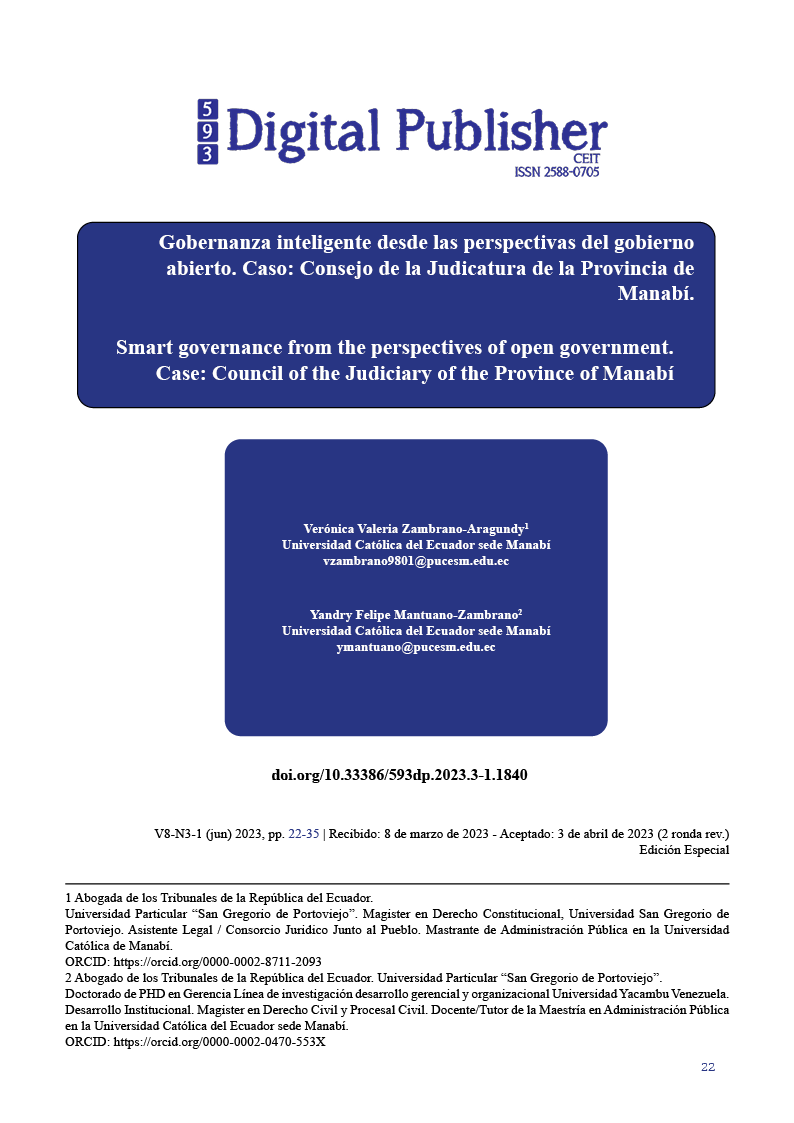Smart governance from the perspectives of open government Case: Council of the Judiciary of the Province of Manabí
Main Article Content
Abstract
The purpose of the research has been to interpret smart governance from an open government perspective, taking into consideration as a case study the Judiciary of the Province of Manabí, in addition to the specific guidelines: Identify the components of governance that make it viable in public management; understand the conceptual aspects of smart governance that support open government and contextualize smart governance as an instrument for open government; The design of the research is phenomenological-interpretative with a qualitative approach, its dimension is inductive, with a descriptive level, a non-experimental naturalistic research, as a strategy the documentary review was applied to know theoretical positions, in addition to what was commented by the key informants; as a strategy of analysis, the premise proposed by the Grounded Theory was proposed, obtaining both substantive and axial codes, substantive concepts until reaching the central category; as well as the use of the hermeneutic method to facilitate the interpretative process of the discourse narrated by the interviewees -expert researchers- given in an in-depth interview (semi-structured). The main resulting finding is shown as a central category called Disruptive governance as a public value, presented as a proposal for good practice for public administration, especially for the Council of the Judiciary of the Province of Manabí. Among the main reflections is the opportunity to incorporate governance as a strategy for transparency and citizen participation, thanks to the approach proposed from the concept of open government.
Downloads
Article Details

This work is licensed under a Creative Commons Attribution-NonCommercial-ShareAlike 4.0 International License.
1. Derechos de autor
Las obras que se publican en 593 Digital Publisher CEIT están sujetas a los siguientes términos:
1.1. 593 Digital Publisher CEIT, conserva los derechos patrimoniales (copyright) de las obras publicadas, favorece y permite la reutilización de las mismas bajo la licencia Licencia Creative Commons 4.0 de Reconocimiento-NoComercial-CompartirIgual 4.0, por lo cual se pueden copiar, usar, difundir, transmitir y exponer públicamente, siempre que:
1.1.a. Se cite la autoría y fuente original de su publicación (revista, editorial, URL).
1.1.b. No se usen para fines comerciales u onerosos.
1.1.c. Se mencione la existencia y especificaciones de esta licencia de uso.
References
Aguilar V., L. (2015). Gobernanza y gestión pública. En línea: https://consultorestema.com/wp-content/uploads/2020/02/Aguilar_villanueva_gobernanza_y_gestionTC.pdf
Barros, A., T. Campero y P. Cabello (2016), Estudio para una gobernanza digital en Chile, Santiago, Ministerio de Hacienda/Ministerio Secretaría General de la Presidencia.
Berggruen G., y Gardels F. (2012). La gobernanza inteligente: datos abiertos y datos masivos al servicio de la innovación en las Administraciones públicas. https://docplayer.es/amp/117233073-La-gobernanza-inteligente-datos-abiertos-y-datos-masivos-al-servicio-de-la-innovacion-en-las-administraciones-publicas-1.html
Bonilla, E., Rodríguez, P. (1997). Más allá del dilema de los métodos. La Investigación en las ciencias sociales. Ediciones Uniandes. Edit. Norma. https://laboratoriociudadut.files.wordpress.com/2018/05/mas-alla-del-dilema-de-los-metodos.pdf
Centro Latinoamericano de Administración para el Desarrollo -CLAD (2020). Carta Iberoamericana de Innovación en la Gestión Pública. Documentos del CLAD: Consensos y Declaraciones. https://clad.org/wp-content/uploads/2020/10/Carta-Iberoamericana-de-Innovacion-10-2020.pdf
Comisión Económica Para América Latina y el Caribe (CEPAL, 2021). Equidad, desarrollo y ciudadanía. En línea: http://www.cepal.org/es/publicaciones/2686-equidad-desarrollo-y ciudadanía-versión-definitiva.
Constitución de la República del Ecuador (2008). Decreto Legislativo 0 Registro Oficial 449 de 20-oct-2008 Ultima modificación: 13-jul-2011 Estado: Vigente. En línea: https://www.oas.org/juridico/pdfs/mesicic4_ecu_const.pdf
Creswell J. W. (2007). Investigación cualitativa y diseño Investigativo. https://academia.utp.edu.co/seminario-investigacion-II/files/2017/08/INVESTIGACION-CUALITATIVACreswell.pdf
Dey, I. (1999). Grounding Grounded Theory –GuidelinesforQualitative Inquiry. Academic Press. https://www.scirp.org/(S(lz5mqp453edsnp55rrgjct55))/reference/referencespapers.aspx?referenceid=775744
Gadamer H. G. (1998). Fundamentos de la Hermenéutica. Siglo XX Editores. https://scielo.conicyt.cl/pdf/tv/v46n1-2/art06.pdf
Ganga-Contreras O., y Núñez-Mascayano G. (2014). Gobernanza de las organizaciones: Acercamiento conceptual a las instituciones de Educación Superior. https://ww.revistaespacios.com/a18v39n17/18391709.html
Glaser, B. (1992). Basic of grounded theory analysis: emergence versus forcing. Sociology Press.
Kooiman (2009). Modelo de gobernanza interactiva. Revista Territorios y regionalismos. En línea: http://revistasacademicas.udec.cl/index.php/rtr/article/view/1360
Meijer, A.; Rodríguez-Bolívar, M. P (2016). Governing the smart city: A review of the literature on smart urban governance. International review of administrative sciences, v. 82, n. 2, pp. 392-408. https://doi.org/10.1177/0020852314564308
Organización de Cooperación y Desarrollo Económicos - OCDE (2019), Índice de gobierno digital OCDE 2019: resultados y mensajes claves. http://www.oecd.org/gov/digital-government/digitalgovernment-index-2019-highlights-es.pdf.
Plan Nacional de Desarrollo (PND, 2021). Plan de Creación de Oportunidades. Gobierno del Ecuador. https://observatorioplanificacion.cepal.org/es/planes/plan-de-creacion-de-oportunidades-2021-2025-de-ecuador
Programa de las Naciones Unidas para el Desarrollo - PNUD (1997). La democracia de ciudadanía: Una agenda para la construcción de ciudadanía en América Latina. En línea: https://controlatugobierno.com/bibliografia/la-democracia-de-ciudadania-una-agenda-para-la-construccion-de-ciudadania-en-america-latina-pnud/
Quintana, P (2006). Metodología de la investigación cualitativa. http://www.ubiobio.cl/miweb/webfile/media/267/3634305-Metodologia-de-Investigacion-Cualitativa-A-Quintana.pdf
Ramírez-Alujas N., Álvaro-Rosales D. (2017). Desde el gobierno abierto al Estado Abierto en América Latina y el Caribe. ISBN: 9789211219494. https://www.cepal.org/es/publicaciones/44769-gobierno-abierto-al-estado-abierto-america-latina-caribe
Ramos-Galarza (2020). Los alcances de una investigación. Revista CienciAmérica (2020) Vol. 9 (3). ISSN 1390-9592 ISSN-L 1390-681X. https://dialnet.unirioja.es/descarga/articulo/7746475.pdf&cd=15&hl=es&ct=clnk&gl=ec
Strauss A, y Corbin J. (2012). Bases de la investigación cualitativa. Técnicas y procedimientos para desarrollar la teoría fundamentada. Ed. Universidad de Antioquia. https://diversidadlocal.files.wordpress.com/2012/09/bases-investigacion-cualitativa.pdf
Taylor S. J., y Bogdán R. (2010). Introducción a los métodos cualitativos de investigación. http://mastor.cl/blog/wp-content/uploads/2011/12/Introduccion-a-metodos-cualitativos-de-investigaci%C3%B3n-Taylor-y-Bogdan.-344-pags-pdf.pdf
Turnbull A. (2013). Organizational Barriers to Digital Transformation. chrome-extension://efaidnbmnnnibpcajpcglclefindmkaj/https://www.diva-portal.org/smash/get/diva2:1218220/FULLTEXT01.pdf
Vegas-Meléndez H., y Solorzano Calero M. (2022). Nuevos enfoques en la gestión pública para una gobernanza institucional inteligente. Revistas 593 Publisher. Sep 30, 2022. https://www.593dp.com/index.php/593_Digital_Publisher/article/view/1448
Vegas-Meléndez H. (2017). Políticas públicas y gobernanza: Articulación para una gestión pública local autónoma. Revista Polis. https://journals.openedition.org/polis/12661
Wengraf, T. (2012). Qualitative Research Interviewing. Revista SAGE. https://methods.sagepub.com/book/qualitative-research-interviewing.



